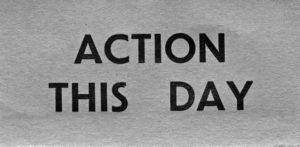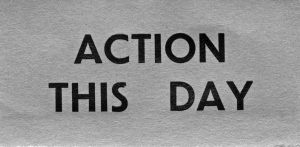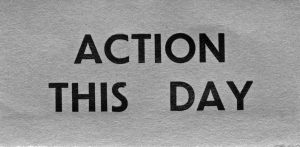Finest Hour 171
Action This Day – Winter 1891, 1916, 1941
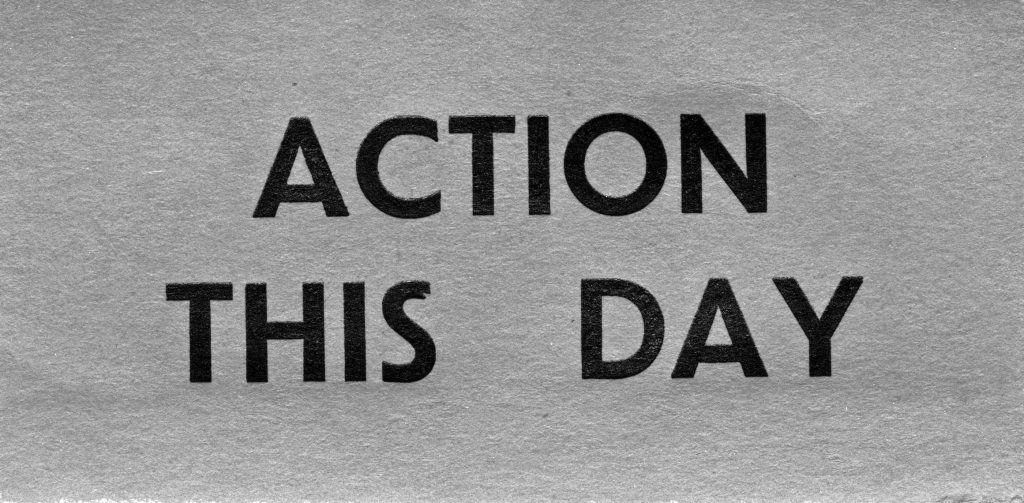
March 20, 2016
Finest Hour 171, Winter 2016
Page 34
By Michael McMenamin
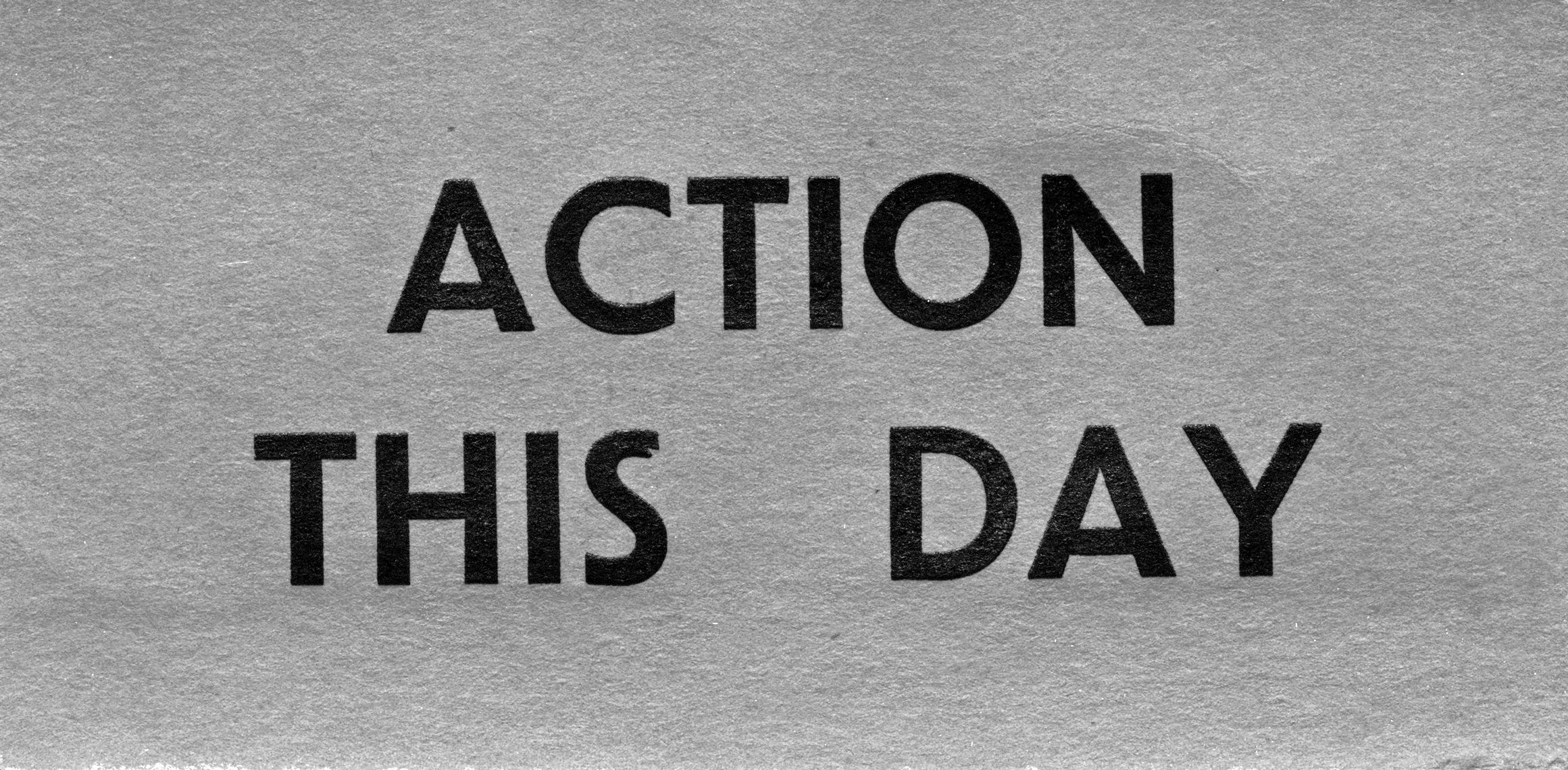
125 Years ago
Winter 1891 • Age 16
“I Am Going to Lunch with Mama”
The winter of 1891 was quite cold, and Winston and his brother Jack spent their holiday at Banstead, their parents’ new country house, which they had found during the summer. Though their parents were not there, the boys had a good time. Winston wrote to his mother on 1 January that “the Pond is frozen 8 inches—The ground is covered with 4 inches of snow. Pipes are frozen—Oil freezes in the kitchen. No wind. V-happy V.well. We are enjoying ourselves very much. We exist on onions and Rabbits & other good things. The ferrets are very well & send their love so do the guinea-pig & rabbit I have bought. If I hear the result of my Examination I will wire.”
Winston received a 19 January letter from the Harrow headmaster J. E. C. Welldon congratulating him on passing the Army’s Preliminary Examination for Sandhurst. Lady Randolph wrote a letter on 26 January to Lord Randolph advising him of this and suggesting that he “might make him a present of a gun as a reward. He is pining for one and ought to have a little encouragement.”
On 5 February, Winston received a letter from his mother’s long-time lover Count Charles Kinsky, who certainly had not hidden their friendship from him even if its nature was left ambiguous. In it Kinsky sent him “all the stamps I could scrape together for the moment. Do you want some more later on? If so say so.” Kinsky concluded the letter by telling him he was having lunch with Lady Randolph: “I am going to lunch with Mama now so must be off. Be a good boy and write if you have nothing better to do.”
100 Years ago
Winter 1916 • Age 41
“Keep Your Hands off My Husband”
1916 was the winter of Churchill’s discontent, and it was largely of his own making. He had left the government for a commission in the Army and a place in the trenches, but he could not leave politics behind.
In early March, upon returning to London from service on the Western Front, Churchill began a process that resulted in a self-inflicted political wound. He learned that there was to be a debate on the naval estimates in the House. Churchill thought this would be a splendid opportunity to attack the Government and the failure of his successor, Arthur Balfour, to follow through on his own policies.
This in itself was not a bad idea, and Churchill previewed his speech at a dinner party arranged by his mother. The guests included the journalists C. P. Scott of the Manchester Guardian and J. L. Garvin of the Observer as well as Churchill’s best friend, the Attorney General Sir F. E. Smith. It was, wrote Roy Jenkins, “a nest of conspirators against the government.” The speech was a quite specific attack on Balfour’s tenure at the Admiralty and was well received by those at the dinner party. Unfortunately, Churchill did not disclose that at the conclusion of his speech he intended to urge the reappointment of Admiral Fisher as First Sea Lord, notwithstanding the fact that Fisher’s resignation the previous May had triggered events that led to Churchill being sacked from the Admiralty.
Fisher came to lunch with Churchill the next day, and both Clementine and F. E. were present. Churchill’s wife showed much more political sense than her husband and told Fisher in no uncertain terms, “Keep your hands off my husband. You have all but ruined him once. Leave him alone now.” Alas, neither man heeded her wise counsel.
By most accounts, Churchill’s speech was well received. According to Jenkins, “He defended his own record well and fired some damaging but not obviously maliciously expressed shots against subsequent Admiralty policy.” Then, he ruined the good impression he had made by urging Balfour “without delay to fortify himself, to vitalize and animate his Board of Admiralty by recalling Lord Fisher to his post as First Sea Lord.” As Martin Gilbert wrote, Churchill “destroyed in a few minutes the whole impact of his speech, turning what had been to that moment one of the most serious and skilful speeches he had ever made into an object of derision. Churchill’s hammer blows of criticism were forgotten. The Government, Parliament, and, on the morrow, the British public, gaped in amazement.”
What was Churchill thinking when, in the words of Jenkins, “He allowed himself to be seduced into the most bizarre alliance”? The Prime Minister’s daughter and Churchill’s great friend, Violet Bonham Carter, left the best explanation. She came to see him at his request. “He looked pale, defiant, on the defensive. I shall never forget the pain of the talk which followed….What he had conceived as a great gesture of magnanimity—the forgiveness of the wrongs Fisher had done him, for the sake of a greater aim, our naval supremacy—was regarded instead as a clumsy gambler’s throw for his own ends.”
Notwithstanding or perhaps not appreciating how dreadful his speech had been, Churchill determined he should leave the Army and return to politics. Selflessly, Clementine advised against this even though she would have preferred her husband home safe by her side rather than exposed to death on the battlefield. She realized, however, that his life was politics and that, if he were to rise again to power, leaving the trenches after being in France for only two months would not help him do so. Churchill ignored her wise advice, asked Kitchener to relieve him, and notified Asquith of this. He also gave Clementine a notice to the press for her to deliver. In the event, he was to change his mind three more times before he finally heeded her counsel.
100 Years ago
75 YEARS AGO
Winter 1941 • Age 66
“A Sheriff Collecting the Last Assets of a Helpless Debtor”
During the winter of 1941 Britain was running out of money, and the United States was determined to squeeze everything it could out of the only country actually fighting Nazi Germany, notwithstanding the fact that President Roosevelt fully realized the threat posed to the United States were Churchill’s government to fall and a successor government to agree to what many in Britain’s ruling class thought were Hitler’s generous terms for peace.
On 23 December 1940, as Britain’s gold reserves in America were running out, the British Treasury representative in the United States, Sir Frederick Philips, was told that, in light of this, FDR had “arranged” for a US naval warship to call in South Africa and carry away the fifty million pounds worth of gold Britain stored there. At the same time, Philips had been urged by Treasury Secretary Morgenthau “from the President to take some action with regard to” selling direct British investments in the US. Upon receiving this information in a telegram from Philips, Churchill wrote to Kingsley Wood, “What about this latest development? I do not like it.”
Lord Beaverbrook certainly did not like it either, telling Churchill that “[G]old in the Dominions… are the last resources of the British people and should be held intact to provide us with the essential means in the case of a compelling necessity to obtain foodstuffs for our people.”
Churchill agreed and used Beaverbrook’s words in a telegram he drafted, but did not send, to FDR: “I am much puzzled and even perturbed by the proposal now made to send a United States battleship to collect whatever gold there may be in Capetown. This would inevitably become known to the world and it would wear the aspect of a sheriff collecting the last assets of a helpless debtor. I cannot tell what the effect would be on public opinion here, or what encouragement it would give to enemy countries….Remember, Mr. President, we do not know what you have in mind, or what the United States is going to do, and we are fighting for our lives.…I should not be discharging my responsibilities to the people of the British Empire if, without the slightest indication of how our fate was to be settled in Washington, I were to part with this last reserve, from which alone we might buy a few months’ food.”
Relations began to improve between the two countries when Roosevelt sent his personal confidant, Harry Hopkins, to England early in 1941. Churchill and Hopkins got along well together, and Hopkins’ reports to the president went a long way to persuading FDR that England was worth supporting. At a dinner, Hopkins praised Churchill’s speeches in May 1940, and Churchill gave a long, eloquent recitation of Britain’s “war aims.” “We seek no treasure, we seek no territorial gains,” Churchill began, and he continued with an emphasis on individual rights and liberties associated with the English-speaking peoples. He then concluded, “We seek government with the consent of the people, man’s freedom to say what he will…. But war aims other than these we have none.” According to Oliver Lyttelton, Churchill paused and said, “What will the President say to all this?”
Lyttleton recorded that Hopkins paused “for the best part of a minute” and then said, “I don’t think the President will give a damn for all that.” Lyttleton was taken aback: “Heavens alive, it’s gone wrong, thought I.” Hopkins paused again and then said, “‘You see, we’re only interested in seeing that that Goddamn sonofabitch Hitler gets licked.’ There was loud laughter, and at that moment a friendship was cemented which no convulsion ever undermined.”
Subscribe
WANT MORE?
Get the Churchill Bulletin delivered to your inbox once a month.

